
































































RMThas launched its campaign to end outsourcing on the railways for a number of reasons, it breeds low pay, systemic racism and poor service standards across the network.
This government has promised ‘the biggest wave of insourcing for a generation’ and we intend to hold them to that and build on what they have started with Great British Railways.
Outsourcing is inefficient and wastes public money while company bosses and shareholders make obscene amounts of money, much of it leaving the country all together.
It is one of the most exploitative practices, enshrining dreadful employment conditions and low pay for workers. Black and ethnic minority workers bear the major brunt of this super exploitation and are effectively trapped in second-class employment, unable to progress in a train company or Network Rail.
RMT will fight tooth and nail to see these workers brought in-house, so they can enjoy the benefits other members have as directly employed workers.
Congratulations to members on Avanti West Coast who have realised their vision of a train wrapped to reflect the diversity of their workforce. And to Leominster and Hereford branch for getting a plaque dedicated to workers who have lost their lives over the years.
Both these projects are examples of workers bringing our narratives and knowledge into the workplace to change perceptions and create a deeper understanding of our history.
It comes as no surprise that Tory shadow transport secretary Gareth

Bacon chose to attack the diversity project at Avanti and threw in an attack on this union in the same breath simply for winning a pay rise after a long battle. The fact that the Tories still want rail staff to be low paid and face racial abuse at work, proves that they are still the nasty party they always were.
This May Day we reminded ourselves that the advances we win are never given to us in some act of kindness by those at the top but through unified struggle. At a time when inequality is increasing and living standards are collapsing in Britain, not enough workers are in trade unions and a tiny percentage of those are covered by collective bargaining.
The antidote is an organised economy with a strategic role for the state driving investment combined with credible industrial planning to bring back high-quality jobs and good housing.
Many are also tired of what they believe to be a brand of politics that is only interested in cancelling and condemning vast swathes of the population, rather than using our traditions in the socialist movement to make the case for real change.
Only an organised society can defeat the toxic politics of division and put the union movement back where it belongs — rooted in working-class life, organising, educating and fighting for a better standard of living for our people, by building unity. If Labour is serious about change, they need to back this agenda. Because tinkering around the edges will not work.
Eddie Dempsey


RMThas demanded that Avanti West Coast act against ticket office staff shortages as it impacts passengers and puts undue pressure on staff.
Following a successful RMT campaign with overwhelming public support plans to close ticket offices nationwide were abandoned. However, Avanti has yet to reverse staffing decisions made during the closure threat.
Over recent months, the company has not replaced staff who have retired, left or taken voluntary redundancy, leading to a shortage of workers at key stations including Birmingham New Street, Manchester Piccadilly, and London Euston.
As a result, many ticket offices are now closed during advertised hours, and passengers often face long queues when they are open.
Current staff are under
significant strain, with increased workloads contributing to rising sickness levels and Avanti is now proposing a rostering review that would effectively lock in the existing shortages.
RMT general secretary Eddie Dempsey said that the public had made it clear that they value and rely on station ticket offices.
“Now that these offices have been saved, they must be
First Group rail operator
Great Western Railway (GWR) has proposed reductions to ticket office opening hours.
It is proposing these changes despite overwhelming public opposition to plans in 2023 to close around ticket offices, including at GWR, which demonstrated the importance of ticket offices and station staff for many rail passengers.
A recent Transport Committee report found that
the ticket office closure plans risked significantly damaging people’s access to rail, and the presence of staff is often a crucial determinant as to whether disabled people can travel by rail.
It is also concerned that GWR’s proposals will undermine the role of ticket offices to the detriment of passenger safety, security and accessibility.
RMT, which represents GWR station staff, is opposed to these proposals and has
expressed concerns about a lack of proper negotiation by the company.
GWR paid out dividends of £24.3m in 2024 and is operating under a National Rail contract managed and funded by the government
The union is calling on the government to instruct GWR to scrap its proposed changes to ticket offices and stations and commit to retaining all ticket office and station staffing levels, operating hours and window provision.
properly staffed. Passengers expect reliability and face-toface service, and our members deserve the resources and support to deliver that.
“We are urging Avanti to act responsibly and restore staffing levels as a matter of priority.”
RMT is encouraging passengers through leafleting campaigns to write to their local MP and to support the union’s campaign effort.


After years of work by activists, RMT has finally signed a recognition agreement for Customer Experience Ambassadors working for Lumo Trains.
This agreement means that RMT can negotiate on pay and conditions for the members who work extremely hard on this open access operator.
The union will enter into a collective bargaining agreement to improve the lives of staff through negotiating pay and working conditions.
Lumo staff are based in Newcastle and RMT regional organiser Gaz Jackson has already met with management to start discussions around the 2025 pay award.
Gaz Jackson said that work now starts on electing reps within the organisation to strengthen membership density.
“Special thanks again to Newcastle Rail and Catering branch members, Martin Bullock, Andrew Scott and Dave King, who welcomed new and potential members,” he said.
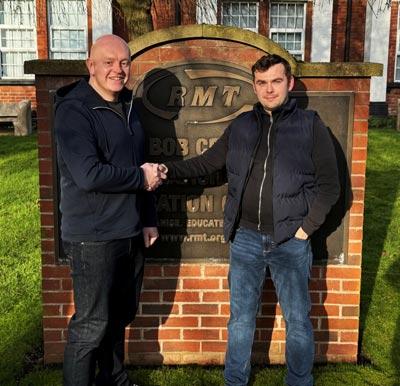
Outsourced cleaners on Merseyrail won improved pay from Churchill after threatening 48-hour strike action.
Outsourcing firm Churchill Services had previously refused to put forward an acceptable offer,
leaving workers no other option but to put on strike action.
RMT general secretary Eddie Dempsey congratulated outsourced members at Merseyrail for standing firm in the face of an obstinate employer.
“This is a great victory for some of our lowest paid workers with an improved offer of nearly seven per cent, 20 days of sick pay and improved overtime rates.
“This win could not have been possible without the
strong resolve of our members.
“It remains our view that these workers should be insourced immediately so they can receive the same terms and conditions as directly employed Merseyrail staff,” he said.


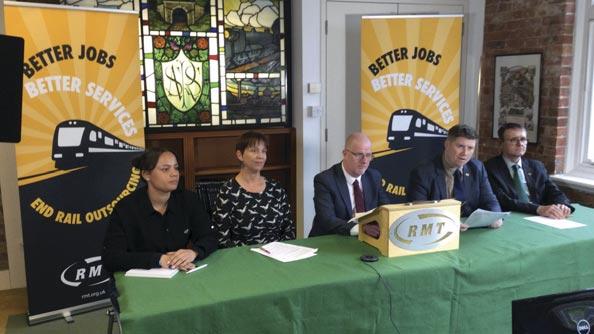
The new era of public ownership in rail passenger transport through the formation of Great British Railways can be seen by passengers, rail workers, and taxpayers as a long-overdue victory.
However, behind the headlines lies a lesser-known issue that threatens to undermine these gains: the ongoing exploitation of thousands of rail workers by private contractors operating in the shadows.
The huge experiment of outsourcing and subcontracting on the rail network
is really a hidden layer of privatisation which exploits thousands of rail workers every day.
As a result, while much of Britain’s rail services will soon be run by the government, a significant portion of the workforce remains employed by outsourcing and subcontracting firms. These companies supply cleaners, caterers, security staff, revenue protection officers, and infrastructure workers—many of whom endure low pay, precarious contracts, and poor working conditions.
Sub-contractors, often hired
to carry out essential infrastructure work such as track renewal and engineering projects, rely heavily on zerohours contracts and casual labour. This practice not only leaves workers vulnerable but also raises serious safety concerns across the entire rail network.
Evidence continues to mount regarding the damaging effects of outsourcing. Over 80 per cent of outsourced rail cleaners report regularly struggling to make ends meet. Many admit to considering
going into work while ill and fearing they won’t have enough money in retirement.
A survey of agency infrastructure workers on the London Underground revealed that three-quarters face similar financial hardships. These findings point to an alarming reality: companies are profiting by keeping workers in insecure, low-wage employment, often without access to sick pay, pensions, or basic job security.
Outsourcing not only creates poor working conditions—it

industry. While black and ethnic minority workers account for 25 per cent of staff in train operating companies and 13 per cent in Network Rail, they represent a staggering 58 per cent of outsourced cleaning and catering staff.
These workers often go above and beyond their official duties—assisting passengers, reporting safety issues—yet they remain locked out of opportunities for advancement, pension benefits, or better pay.
This disproportionate representation and lack of career mobility amount to systemic racism embedded in the structure of outsourced employment in rail.
The knock-on effect of poor working conditions is a decline in service quality and safety. Between 2022 and 2024, outsourced cleaning companies missed cleanliness targets on 60 per cent of rail franchises.
More than 80 per cent of rail cleaners also said that they
felt pressured to cut corners due to staffing shortages. 83 per cent of outsourced workers believe passengers would receive a better service if their jobs were brought inhouse under Great British Railways.
The risks extend to infrastructure as well. Subcontracting has contributed to major safety failures. In 2020, a derailment near Carmont led to the deaths of three people after outsourced drainage work was changed without Network Rail’s knowledge.
Multiple safety reports from the Rail Accident Investigation Branch (RAIB) have condemned the use of zerohours contracts, warning that workers juggling multiple jobs face increased fatigue and reduced ability to report safety concerns.
In 2014, the Office of Rail and Road acknowledged that ‘the widespread use of ‘notionally self-employed’ staff on zero hours contracts …has a generally negative effect on the attitudes and behaviour of those involved, which is not conducive to the development of a safe railway.’
In 2019, Network Rail was advised by the RAIB to end its use of zero hours contracts after a worker was struck by a train and killed between London Bridge and Three Bridges.
“When workers are employed on a casual basis on zero hours contracts, there can be great pressure for them to try and juggle multiple jobs to make ends meet.
The possible effects of such patterns of employment on fatigue and fitness for work are significant. We are therefore recommending that the railway industry reviews the way it manages the use of staff on zero hours contracts, to minimise the risk associated with this pattern of work,” the RAIB report said.
In 2022, after an agency worker was hit and narrowly escaped with her life on London Underground, the RAIB again warned of the risks of using casual workers. RMT surveyed agency track workers on the Tube and two thirds of them said they would feel uncomfortable raising a safety issue for fear of losing work.
Despite declining service quality, these outsourcing and sub-contracting firms continue to extract hundreds of millions of pounds from the railway system each year.
RMT estimates that around £400 million annually is diverted from public transport into private profits—£180 million from Network Rail and £120 million from passenger services.
These profits often go to investment banks and private equity funds, not reinvestment in rail services.
For example, Mitie Plc paid £41.5 million in dividends and awarded its CEO a £14 million remuneration package. SSP Group, a catering giant, has handed out over £544 million to shareholders since 2018.
Balfour Beatty, a major
construction firm, paid £58 million in dividends last year.
All three companies are actively engaged in share buyback schemes, using profits from the rail sector to boost their stock prices instead of reinvesting in better services or worker welfare.
During the pandemic, outsourced rail workers were rightfully acknowledged as essential key workers. Their mistreatment could no longer be hidden.
Thanks to campaigns led by RMT in Scotland, cleaners are now directly employed. In Wales, the Labour government has insourced both cleaning and catering staff.
In London, thousands of outsourced workers now have free travel, and campaigns continue to bring over 2,000 Tube cleaners in-house.
With a new Labour government pledging to deliver the “biggest wave of insourcing for a generation,” there is real momentum for change.
The union is campaigning to bring all rail jobs back into public hands under Great British Railways. You can help end the exploitation of essential workers and ensure that passenger fares and taxpayer money go toward delivering better jobs and better services—not into shareholder profits. Join the movement for a fairer, safer and more just railway system.
RMT has secured a big win after Rail Gourmet agreed to full union recognition and a collective bargaining agreement following months of sustained industrial pressure from members.
The company has now conceded to all union demands and will sign a
comprehensive recognition agreement in a major reversal of its long-standing refusal to engage properly with trade unions in the workplace.
As a result, the two days of strike action due to take place in May has been cancelled.
RMT general secretary Eddie Dempsey said that it
was a huge win for members.
“Rail Gourmet, a company that has previously failed to work properly with trade unions, has now made the right decision to create a framework for proper negotiation.
“Our members strong resolve was the driving force
for this victory, and this is what union power looks like.
“Securing sectoral collective bargaining across vast swathes of the economy is an absolute must for workers if we are to going to see improved wages, decent conditions and job security going forward,” he said.
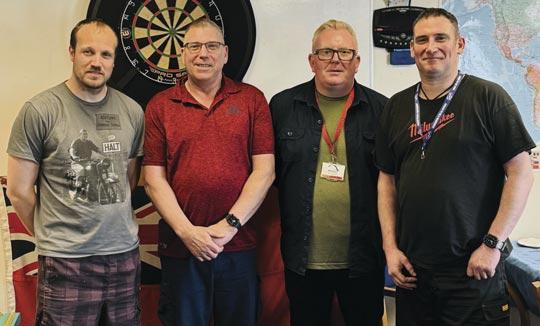
members at Foreland Shipping have overwhelming rejected a one year pay deal for 3.9 per cent and they are in dispute with this employer for the first time.
This was a fantastic 87 per cent turnout in the ballot and members have demonstrated that they are prepared to stand firm.
The referendum result follows revelations over pay, profit and dividends at the
company and at its owner, Hadley Shipping Group which gave its top director an eyewatering 52 per cent pay increase in 2023.
A seven-year extension of the Ministry of defence contract for £476 million is welcome but the employer has paid out nearly £130 million in dividends and directors’ pay is sky-rocketing whilst Ratings pay has fallen 10 per cent behind inflation in recent
years.
RMT General Secretary Eddie Dempsey said that it was a textbook case of profit hoarding and exploitation.
“Foreland Shipping’s owners have raked in massive profits and dividends off the back of a publicly funded MoD contract.
“However, the very seafarers keeping that contract afloat are being left behind.
“For over two decades,

shareholders and executives have cashed in while allowing our members’ wages to fall in real terms.
“If the company can afford millions in dividends, it can afford to give our seafarers a decent pay rise,” he said.
The union argues that the situation reflects a wider failure in public-private partnerships, where private interests pocket public money while workers shoulder the strain.
Two newly elected representatives at City Cruises in London Deen Balnock and Nick Paul met RMT national secretary Darren Procter at Unity House. The newly elected reps represent cabin staff and pier staff and raised matters of concern and how the union can become better organised within the workplace.
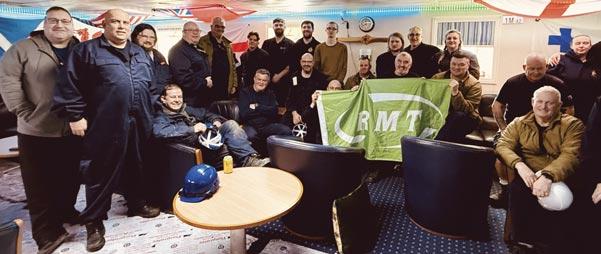
The union’s Royal Fleet Auxiliary (RFA) convenor Ian Parkin made four shipboard visits to RFA members currently working in Cammel Laird shipyard. He updated members on industrial matters whilst identifying new activists to become involved with the union as part of the RFA organising committee.
Following a resolution from Southampton Shipping branch, the union has initiated an organising committee and received applications from 18
volunteers who wish to become more actively involved in the union to support the convenor to help organise more effectively.
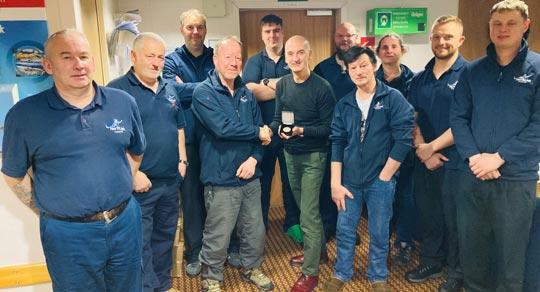

Hamnavoe and Hjaltland which included a 40-year
"I am delighted to make this presentation to Davey, not least because I met him
NorthLink Ferries operates passenger and vehicle ferry
July 2012, it has been operated by international services company Serco.
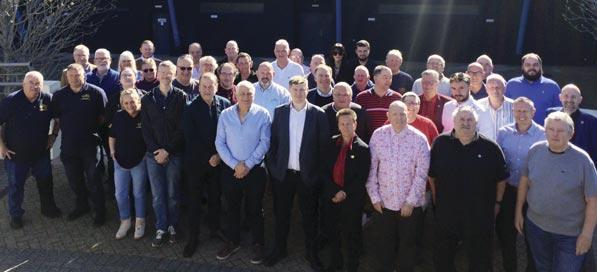
RMT’s annual national organising conference of bus workers discussed the government’s current Bus Services Bill and amendments which the union has put forward.
RMT general secretary Eddie Dempsey reported that the union had been campaigning on employment protections, collective bargaining across the industry and the creation of a National Bus Forum comprising government, operators and unions.
“We need to develop an industry wide approach to pay and conditions,” he said.
The union used the progress of the Bill through Parliament to raise issues such as working hours and rest breaks and health and safety issues. RMT also worked with the TUC to produce a joint union position statement on employment protection matters submitted to the government.
A range of amendments were tabled by Labour Peer Lord Tony Woodley when the Bill was introduced in the House of Lords. The union is also campaigning to bring rules governing driving hours in line with HGV drivers, with no loss of pay.
RMT is pushing for legal requirements for bus drivers to take a break after a maximum of 5.5 hours on duty and the creation of an independent bus accident investigation branch.
As a result of the issues raised in the Lords, the government has made commitments to address employment protections for the workforce and the Department of Transport (DfT) has confirmed that the unions will be consulted on the development of this guidance.
Regarding anti-social behaviour (ASB), the union has written to the Bus Minister Simon Lightwood MP to express disappointment that
the union had not been consulted prior to the introduction of the Bill and the need for trade unions to be consulted.
The government has tabled an amendment to clarify that it does not expect bus workers to intervene in dangerous situations. The DfT has also confirmed that it will consult the unions in the development of its guidance on ASB training.
Speaking for the national executive committee, Lee Rundle reported that the government had not yet agreed to establish a National Bus Forum, but it did commit to using its convening powers to ‘bring stakeholders together’.
“The union will continue to pursue this matter with the government,” he said.
In the final stage in the Lords, amendments addressing staff assaults were passed as they gained crossbench support.
The union has also written to the Bus Minister to set out the issues which the union will be taking to the Commons and is seeking supportive MPs to raise amendments that were not debated in the Lords due to lack of time.
The union will continue to work with the government and the DfT to follow up on commitments around developing guidance in several areas.
Steve Wilson, Truro said that there had been several catastrophic bus fires in the South West alone and called on the union to campaign to highlight the issue.
“It is clear that we are driving clapped out buses and we need investigate the underlying causes of bus fires to understand how they can be stopped.
“We need new industry standards and legislation for design, construction, and furnishings to significantly reduce the likelihood of
catastrophic fires that will make public transport a safe way to travel without fear,” he said.
Lee Odams, Notts & Derby called for the bus bill to include the introduction of an independent investigatory body such as provided to the rail and air industry.
“This should include the creation a national bus crash investigation branch,” he said.
Simon Pick, Notts & Derby
called for support for a bus drivers’ bill of rights.
“We need to provide bus and coach workers basic human rights and a national standard through a bill of rights,” he said.
Lee Odams also called for an enquiry into afety problems associated with Transport for London ‘contracted bus market’ model.

RMT undertook two surveys of bus members, and the findings featured in the union’s responses to the Transport Select Committee and in briefings for politicians.
The survey findings found that less than a third had seen any improvements to bus services in their area since the previous government introduced enhanced partnerships.
Over 90 per cent think that all local communities should have guaranteed minimum service frequency for local bus services.
Three-quarters thought that it would be more reliable service if local authorities delivered their bus services via a publicly owned company and nearly 90 per cent were aware of bus workers leaving to join other sectors in the last year.
Half of members backed the need for the government to identify anti-social
behaviour and 90 per cent thought that requiring bus workers to deal with it could put their personal safety at risk.
In terms of measures to reduce violence on buses, nearly 90 per cent cited the need for working CCTV on all bus services, for action taken against perpetrators and nearly three quarters called for the creation of a specific offence of abusing or assaulting a bus worker.
Nearly two-thirds had had abusive behaviour directed towards them at work in the past year and nearly 90 per cent do not think their employer has sufficient measures to protect them.
Unlike the rail sector, less than a third of members said that they have access to an Independent Confidential Reporting System such as CIRAS at work and 84 per cent said that they wanted access to it.
More than a quarter were aware of a serious bus fire incident at their company in the past five years and nearly half of members said they had worked excessive hours in the past year.
Over 90 per cent of bus members reported fatigue and poor work-life balance, nearly 70 per cent reported work-
related stress and over 50 per cent suffered musculoskeletal problems.
95 per cent said that requiring bus drivers to work excessive hours increases safety risks within the sector and 60 per cent said that they do not get sufficient time for rest breaks during shifts.

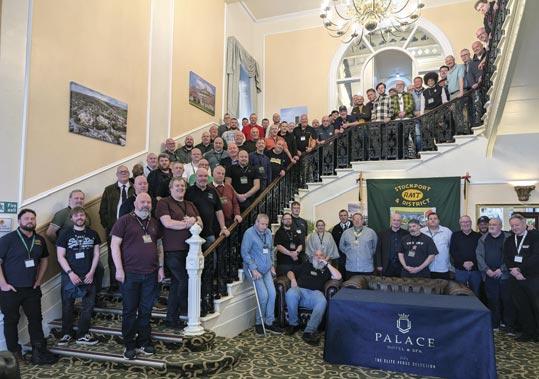
Outgoing general secretary Mick Lynch received an enthusiastic welcome from signal workers at their recent meeting in Buxton when he thanked them for their support during his time in office and the national dispute.
“Most members hadn’t been involved in industrial action before and we inspired other workers. We came out of it the most respected union in the movement,” he said.
Reminding delegates of the scale of the industrial action, where at one point the union had 53,000 members on strike, Mr Lynch then explained the scale of the
assault on the union by the former Conservative government.
He said that it had planned to change the way industrial relations were conducted, including the ending collective bargaining, which the union’s actions had successfully stopped happening.
Instead, much of the union’s longstanding goal to bring the industry into public ownership is now being carried out by the current Labour government.
RMT general secretary Eddie Dempsey paid tribute to his predecessor saying that the union was in a healthy
state with a growing membership of 81,500 and good financial health.
He outlined the union’s plans under his stewardship with a radical digital transformation project that will result in an advanced RMT activist platform.
This will mean significant improvement in important campaigning tools like peerto-peer texting and phone banks among other things.
He said that the way the union organises a campaign would change and more focused on organising the grade. The biggest national campaign would be an
industrial and political campaign over insourcing jobs so that cleaners, caterers and other workers can be brought in house.
He outlined how the Greater British Railways (GBR) project would end much of the private involvement in passenger rail services. This would mean that the union would not be dealing with profiteers but directly with the British state.
“This requires a new approach to industrial relations, but it also mean that workers can make their voices heard and could bring the railway to a standstill if
necessary.
“Our power will come from shutting the railway and that needs much better organisation,” he said.
Reports from national lay council and health and safety representatives led to much discussion on conference floor with the reps being held to account for their work over the previous year.
Lewis Hudson, York and District told delegates that the fact that Sunday working is not included in the contractual 35 hour working week was an issue that needed to be resolved to reduce members’ working hours.
“We need to incorporate Sundays into the working week, to reduce the need for excessive hours being worked and to strike a decent work life balance, with an adequate increase in salary to compensate this proposed change,” he said.
Following a lively debate delegates agreed to call for the union to carry out a referendum to consider whether negotiations should be entered into with management over the issue. It was made clear that a referendum vote would not be binding on changes to the present terms and conditions and that any negotiated outcome would require a ballot to be taken allowing for the offer to be considered by the membership with the option to either accept or reject it.
Steve Conway, national executive committee, reported on the work that the union had carried out in the last year to support the signalling and operations grade.
Richard Williams of RMT’s legal department outlined how the union supported members and fielded a raft of technical questions from delegates. He explained how the department had successfully refined its approach to casework over recent years.
Mick Knox, Southall, Ealing & Slough, spoke about his
unfair dismissal and subsequent successful claim against Network Rail.
Mick Knox had worked as a signaller for 26 years and was an area council representative when he was dismissed in February 2022 over allegations of gross misconduct, which he vehemently denied. He brought claims of unfair and wrongful dismissal in the employment tribunal and was represented by the union’s legal department.
Mr Knox told delegates how the tribunal was critical of the disciplinary investigation carried out by Network Rail. It found that there was inconsistent evidence which the investigating manager made no attempt to resolve, that discrepancies were ignored, that the investigating manager put pressure on a witness and tainted the reliability of some evidence.
The tribunal also found that the investigating manager had a negatively skewed view of Mr Knox and was convinced of his guilt before having interviewed him. It concluded that the investigating manager’s approach to the investigation tainted the evidence before the disciplinary officer.
In upholding Knox’s unfair dismissal claim, the tribunal found that Network Rail did not have reasonable grounds upon which to believe that Brother Knox was guilty of the misconduct for which he was dismissed, and that the investigation was not within the range of reasonable responses. The tribunal also concluded that no reasonable employer would have dismissed Brother Knox for the allegation on the evidence before it.
The tribunal ordered Network Rail to pay over £75,000 to Knox comprising of notice pay, a basic award and compensation. The tribunal awarded him the maximum amount of compensation for his losses, as such awards are capped by legislation.
“This has been a long process, and I want to thank the national executive, Eddie Dempsey and Mick Lynch for sticking with it and supporting my case,” he said.
Nikki Roache told delegates
that she was standing down after many years as conference secretary and thanked delegates for their support over her time in the role. The new secretary will be John Richards.



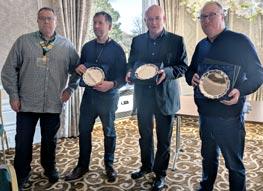
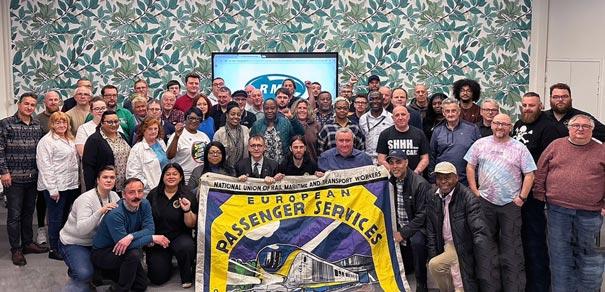
Delegates attending the national industrial organising conference of station grades meeting in Lille, France called for action against the escalation of assaults on frontline transport workers.
This included a presentation about how the union has prioritised a campaign to combat violence and assaults across the transport network.
Some of the issues involved lone working, ticket office closures and British Transport Police (BTP) cuts. The union is seeking a change in legislation to increase deterrents against assaults and highlight the impact on vulnerable groups. Legislation was also
required to regulate staffing levels on trains and stations and a reversal of cuts to ensure that the BTP is more responsive to staff assaults.
Ultimately an increase in RMT membership density and increase the number of health and safety representatives in the workplace would empower staff at the workplace.
Keiren Offlands, East London Rail said that outsourced workers were often even more vulnerable because they were not directly employed and had even less protection.
Ross Marshall, Central Line West said that station staff had been at the forefront of the
rise in staff assaults.
“We remember the tragic death of brother Jorge Ortega at Ilford in 2024 which was again a record year for staff assaults.
“Enough is enough, it is time to look at using our industrial muscle to defend our members at work because rail companies have simply not made safety improvements,” he said.
He pointed out that when members defend themselves, they are often targeted rather than the perpetrators.
Delegates called on the union to demand that the rail regulator hold companies to account under duty of care
arrangements and risk assessments.
Chevelle Jacobs, East London Rail said that at Goodmayes station a member was stabbed and only just survived.
“This is a serious situation, and I think it’s time to stand up and take action,” she said.
David Clews, North Thames said that many stations on his line were completely unstaffed despite being dangerous areas with a history of violence.
“Let’s start thinking of safety,” he said.
Keith Miller, Central Line and North Mersey said that there had been huge cuts in BTP numbers across the
country.
“This is at a time when we are seeing over 80,000 violent assaults on the rail network.
“BTP chief constable Lucy D`Orsi has claimed that due to a shortfall of £8.5 million the force had no option but to implement cuts and close some BTP offices across the rail network.
“We need to increase funding to what is already a woefully inadequate presence on our trains and stations,” he said.
Eli Edwards, Paddington called for a more visible BTP presence to encourage people to put statements in to bring about prosecutions.
Mike Hamilton, Brighton said that following Jorge Ortega’s death, Paul Attwell of BTP is quoted as saying “I
would like to assure the public that this is an isolated incident”.
Mike pointed out that the evidence contradicts this because anti-social behaviour and staff assaults have become a reality that station and on-board staff that face.
“We need a total upgrade of CCTV at all locations, more funding for the BTP and an end of lone working and staffed stations,” he said.
RMT assistant general secretary John Leach said that the union was committed to raising the issue of assaults for all members regardless of who their employers were.
“Whether you work for a train operating company or an outsourced agency worker you are still just as likely to be assaulted at work.
“We need to raise this issue industrially and politically until violence on the transport network is taken more seriously,” he said.
Delegates unanimously backed a call from John Harvey, Central Line and North Mersey calling for a campaign to stop ticket office closures by stealth.
He said that government plans to re-nationalise the railway through Great British Railways (GBR) needed to put an end to the rip-off years of privatisation and preserve ticket offices.
“We must demand that GBR reopens and restaff all ticket office’s previously closed and restaff all stations,” he said.
Mike Swift, Reading warned that many train operators were
looking at ‘repurposing’ ticket offices which really meant shutting them down.
Josie Partington, Blackpool and Flyde Coast said that to increase accessibility of passengers as required many operators were trying to make staff multifunctional instead of employing more staff.
“This means existing staff are run ragged and other customer facing roles suffer as a result.
“We need to push for companies to increase directly employed additional staff rather than just moving the deckchairs around,” she said.
Steve Finn, Leeds warned that ‘passenger assists’ were going through the roof across the country, but companies were not putting in resources to deal with the issue.






Show your support for the union.
Go to the RMT webshop on the RMT web site for more details.
Promote your branch, region and the union - call Pellacraft on 01623 636 602 if you have any queries.

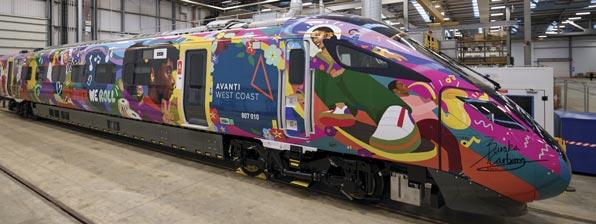
RMT members and front-line
Avanti West Coast staff Marcia Graver and Marvia Norman had been discussing how to reflect the diversity of the workforce while organising Black History Month events for some time.
Marvia decided to email the then managing director about the idea of wrapping a train to promote this inclusive message. This seemingly random and audacious message straight to the top of the company elicited an immediate positive response.
That was how the concept for a wrap on one of the new fleet of trains with a design to reflect the diverse race and ethnicity within the company as well as the communities across the West Coast Mainline came about.
The theme is Together We Roll and the aim has been to celebrate the people who work on the railway and the diverse communities it serves.
Unfortunately, the Covid pandemic put the project on
hold as it did across society in general. However, Marvia, a customer service assistant of seven years, and Marcia, a chef who joined British Rail back in 1998, were not to be put off.
The pair had worked with RMT regional organiser Kathy Mazur on cultural events, so they were both experienced in discussing diversity issues in the workplace.
It had been widely agreed that as trains travel through multiple communities, it effectively made them moving billboards for diversity and inclusion. As a result, passengers, pedestrians, and motorists see the message, reinforcing positive social values.
Such public displays of diversity directly support
marginalised groups and can help promote unity as it signals that the transportation service values all individuals, regardless of background.
“We are a railway family, and we wanted to explore and express that feeling to increase morale and building confidence in the workplace,” says Marvia.
So, the idea of a diversity

Marvia Norman
train was realised.
Marvia and Marcia were involved in several workshops arranged for front-line staff inviting them to bring objects and materials that represented their various cultures including clothing, food and pottery.
“We had a lot of fun creating what would be a celebration of our differences and our unity, and the amazing thing was that different workshops came up with the same concepts,” says Marcia.
Created by digital artist, Baraka Carberry, alias Bokiba, who describes the design as “scenes of people, culture, colours, and joy”, the artwork stretches across all seven carriages of one of the intercity operator’s new Evero trains, set number 807010.
The train will be introduced into passenger service later this year – completing the roll out of Avanti West Coast’s Evero fleet. To mark the Together We Roll wrap becoming a permanent part of the train operator’s fleet, a competition will be held to name the train.
Carberry already had a background in designing wraps like this, including for Transport for London, and she went to work.
“As a Black British artist, diversity and inclusion hold deep personal significance for me, making this project
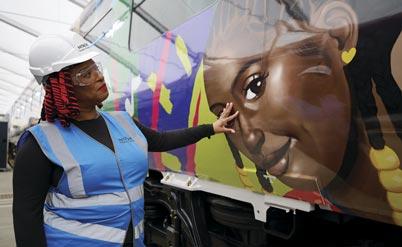
particularly meaningful.
“I envision it as a living, evolving artwork that has the potential to resonate with the public. My hope is that people will connect with the universal moments captured here and reflect on their own unique legacies.
“When we think of ‘legacy’, we often focus on grand, monumental achievements.
“However, I believe it’s the small, everyday moments— sounds, sights, and notes— that build the foundation for something much greater.
“True legacy evolves, growing and transcending to become something larger than life,” she said.
RMT general secretary Eddie Dempsey said that RMT
was extremely proud that members at Avanti West Coast had directly pushed for this project to happen.
“This continues the excellent work naming a train after one of our members, Asquith Xavier, the first black guard back in 1966 to work at Euston.
“We have come a long way since then and it is wonderful to celebrate the diversity on our railways,” he said.
Marcia added that seeing the train was a source of immense pride. She said: “When I first saw the train, it made my heart skip a beat, I’ve been on the railway for over 25 years and never seen anything like this at all.
“You really can see a bit of
everyone on the train, and it’s always been a dream to have representation and now it’s a reality!,” she said.
And Marvia says that this process had been a selforganising and motivating experience.
“This is a celebration but also a chance to change attitudes and leave a legacy among the workforce and across the country for all ages and all grades.
“We want to encourage discussions on equity and social justice in an inclusive way,” she says.
And what better way to do that then creating such beautiful and engaging visual messages?

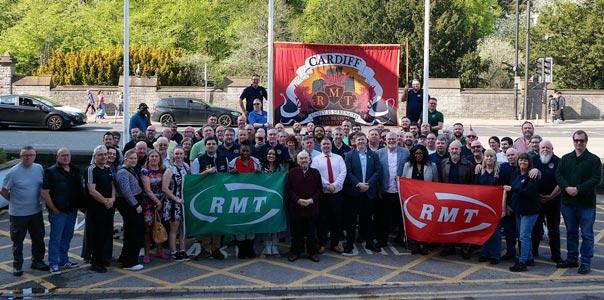
Delegates to the train crew and shunting grades meeting in Cardiff called for consistency, safety, and fairness in the workplace.
Delegates highlighted several long-standing issues affecting rail staff, from fragmented training standards to inadequate support following traumatic incidents.
Disparities in post-incident care for rail staff were raised and concerns over a ‘two-tier’ approach to support following fatalities involving trains were a major topic of discussion for delegates.
Train drivers reportedly receive immediate assistance, including managerial presence and relief drivers whereas other frontline staff, such as guards receive little more than a phone call, delegates agreed.
Delegates called for a review of current procedures to ensure consistent and equitable support for all staff affected by such incidents.
Rick Woolley, Liverpool No.5 said: “We are both shocked and appalled to learn that the level of care afforded to train crew grades in the
immediate aftermath of a fatality incident which is virtually non-existent.
“Dialogue needs to be opened with management to ensure that when train crew and shunting grades involved in fatality incidents are treated in the same manner and with the same level of respect as our driver colleagues,” he said.
Dalbir Dhillon, Manchester Victoria gave a moving account of his experiences dealing with a fatality and how the company treated him following the incident.
“I was advised by control to go down with a hi-vis on to the track and to check the driver was ok. In doing so I ended up seeing the remains of the body.
“And I remember control asking me if they could get a relief driver out, to replace the driver, would I be willing to turn round and take the service forward.
“When I turned round and said no, they said ‘are you sure... it will inconvenience passengers and add to cancellations going forward’.
“That’s how little they think
of us as other grades that are not the driver,” he said.
he urged a change in approach from employers and to take their duty of care to all grades seriously around fatalities, warning that mental health issues such as PTSD could become present when members are forced to deal with traumatic incidents.
Cathy Carney, South London Rail supported the motion but successfully called for it to include ‘onboard supervisors’ who must deal with fatalities.
Kieran Wildman, Ashford No.1 who is a shunt driver, pointed out that in his role trains come into the depot that have been involved in fatalities.
“I had a train come into the yard, literally last week and the sight and smell were awful and there is no support whatsoever. So, I would like the shunters to be included,” he said.
Delegates also raised concerns over outdated recruitment practices, including the exclusion of applicants who have undergone laser eye surgery
and pressed for modernised, medically sound policies across all operators.
Annila Saghir, Kings Cross argued that train operators like Transpennine Express were unfairly excluding candidates who have had laser eye surgery from applying for safety-critical roles such as a conductor or train manager.
She pointed out that this restriction was outdated, medically unjustified and inconsistent with practices at other companies like LNER.
“This is discrimination dressed up as a health and safety concern.
“If we are moving towards GBR, we need to have harmonised standards. This is about fairness and removing arbitrary barriers that serve no purpose,” she said.
Neil Sharples, Wigan said: “What we have here is a case of TOCs running away with their own ‘safety’ cases and coming up with nonsensical policies”.
Billy Kimm, Liverpool No. 5 branch also called for the development of a national,
standardised training framework for all train crew and shunting grades.
Delegates argued that decades of privatisation had left the workforce operating under a fractured system, where route learning, yard operations, traction knowledge and other fundamentals varied widely between operators.
With GBR presenting a unique opportunity to create cohesion, the motion called on the union to take the lead in developing national agreements to restore consistency, improve safety, and allow for seamless staff movement across the network.
A call for a ban on nonfoldable e-bikes on the rail network due to issues around battery fires also won widespread backing from conference.
RMT general secretary Eddie Dempsey reflected on the changing state of the economy and the world of work since the advent of neo-liberalism in Britain under Thatcher.
“This meant selling off our
national assets, privatising public services, outsourcing huge swathes of employment, and dismantling the industries where we used to make things, shifting production overseas in pursuit of a socalled service economy.
“The result? Entire regions left in poverty, with people stripped of hope. And it wasn’t just the loss of jobs or industry.
“The trade union and labour movement—the institutions woven into the fabric of working-class life across Britain, were torn out along with them,” he said.
But despite these challenges, Mr Dempsey added: “Put us back in the communities that have been torn apart. Restore the trade unions to where they once were—at the heart of working life—giving people a sense of community, solidarity, and responsibility to one another.
“If we do that, we can raise living standards, restore dignity at work, and start building the foundations of a better society,” he said.
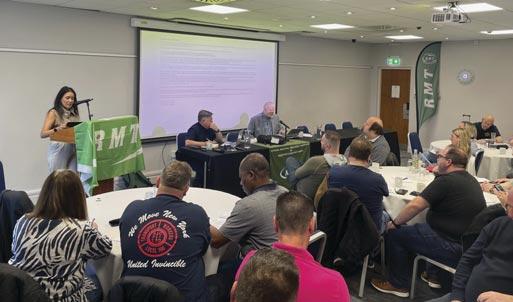
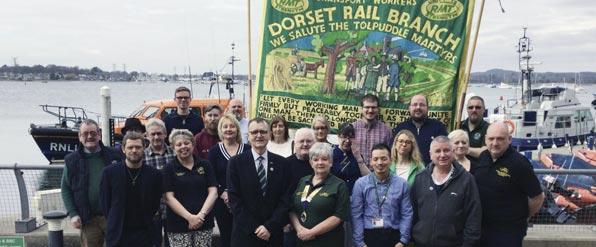
A well-attended hotel, catering and ancillary grades conference meeting in Poole called for catering services to be expanded, an end to lone working and for jobs to be brought in-house.
RMT assistant general secretary John Leach told delegates that new government legislation effectively meant that rail passenger franchises must be run in the public sector. However, he pointed out that open access rail operators were not subject to the new legislation, something the union opposed.
“The government plans to establish Great British Railways (GBR) to absorb Network Rail and the train operating companies which will mean effectively that the majority of rail workers will have just one employer.
“This represents a significant victory for the union after years of campaigning through successive governments.
“Under privatisation, catering provision has been watered down or completely removed in the drive to reduce staffing costs and increase profits.
“As part of the GBR
consultation process, RMT will be making the case to expand and enhance catering staffing and service provision and insource those jobs which are currently outsourced,” he said.
He outlined the union’s campaign to mobilise members around insourcing, recruitment and organising among outsourced workers such as cleaning, catering, security and train maintenance and sub-contracted infrastructure workers.
“We are an all-grades union, and we need to reflect that in our aspirations and help raise the confidence of all workers,” he said.

Mandy Evans, Swansea No1 called for an end to lone working to lower the risk to catering workers.
“This is a serious issue because of the abuse and assaults we face every day,” she said.
Roxsanne Lesieur, Leeds said that crime and abuse was widespread on the rail network.
“It’s so important that we raise this issue as these levels of crime are growing,” she said.
Scot Wheeler, Paddington No1 said that rolling stock refurbishment combined with the advent of GBR represented an opportunity to establish an industry-wide standards for catering and the return of buffet services.
“As a result, we need to relaunch the Bring Back The Buffet campaign to enhance the experience of passengers.
“A buffet can serve as a mitigating factor against antisocial behaviour and assaults.
“We need a static point of service for catering staff, it’s safer and we are less prone to injuries on jolting trains,” he said.
Maggie Smith, Bristol Rail
said that it was the perfect time for such a campaign with GBR coming online.
“We need to re-introduce the buffet as we are getting injuries with the continual use of trolleys which also threatens the safety of passengers,” she said.
Mandy Evans said that a lot of work went into the previous buffet campaign.
“We already have the arguments, and they need to be raised again,” she said.
Sarah Howells, Swansea No1 called for a national catering badge and lanyard to increase the identity of the grade.
This year’s Chris Kefford award was presented to longstanding president of the grades conference Mandy Evans. Presenting the award, John Leach paid tribute to Mandy’s work in the union for over 30 years.
“Mandy has served this conference and the union for many years with great humour and always encouraged members to stick up for themselves and to take up positions,” he said.
Conference next year will take place in Tenby.
The scourge of staff assaults and outsourcing must be tackled, delegates declared at the Supervisory, Clerical and Salaried grades conference in Edinburgh.
Conference unanimously voted for two resolutions dealing with workplace violence following the loss of Jorge Ortega, who tragically died when he was assaulted at Ilford Station in December 2024.
The motions highlighted ongoing concerns about violence and anti-social behaviour affecting frontline rail staff.
Delegates agreed improving staff safety was vital and that ending lone working was part of the solution.
Moving both resolutions, Tom Bayliss, Brighton and Hove said that members were all “deeply shocked” by what happened to brother Ortega.
“We need top grade CCTV, more funding for British Transport Police (BTP) and cessation of lone working practices, whether that’s stations or trains with a minimum of two members of staff from start to finish,” he said.
Combatting staff assaults will form the backbone of RMT’s national industrial campaigns along with insourcing and making sure that the Labour government honours all its commitments around taking the railways back into public ownership.
Guest speaker and RMT regional organiser Craig Johnston told delegates: “The powers that be are planning at least 20 per cent cuts to the British Transport Police.
“While I accept that there are ambulance services, security, and various safeguarding officers—Mitie and all the rest of it—the only people who have the powers to deal with serious assaults on the railway are the British Transport Police.
“We need to oppose these cuts for the benefit of our own people,” he said.
He highlighted the need for insourcing and for Labour to ensure they keep their promises.
“I want to ensure that outsourced staff have a path into the same terms and conditions, collective bargaining, rights, and pay structures that we have.
“I believe that’s one of the biggest steps forward.
“We will show these workers that we have an agenda for them—one that is potentially achievable.
“That might mean calling all outsourced workers out on strike on the same day, to highlight the fact that they’ve been exploited for far too long, in far too many places.
“This is an opportunity— under a government that claims it’s in favour of insourcing—to try and achieve those goals.
“We need to take on that task, and we need to do it with relish and commitment,” he said.
Keeping with the theme of the safety of railway workers and of the travelling public, RMT Scotland organiser Gordon Martin hit out at Network Rail for its approach to maintenance of the railway.
“In Scotland, all we’re seeing is cut after cut after cut.
“They’ve replaced boots on ballast with technology.
“And I think that puts people on the ground in danger, especially during live operations.
“The eyes, ears, and
experience of the men and women who maintain the railway are, in my view, far better than a drone flying 100 feet above it,” he said.
He issued a stark warning to those cutting maintenance schedules and renewals on the railway: “This will end badly… with a train going down an embankment. I believe is a fact of when and not if”.
Other motions passed at the conference included a call to nationalise all ticketing and to put an end to companies like Trainline and Uber cashing in on digital ticketing.
Portsmouth branch delegate and conference president Sean Hoyle issued a call for no staff reductions as the railways are brought back into public ownership under GBR.
Hayley Bouchard, Wimbledon was unanimously supported moving her motion for the Bob Crow organising day to be put back in RMT issued diaries.
Conference also struck a sombre note throughout as delegates shared memories of former NEC member Willie Strang who died last year.
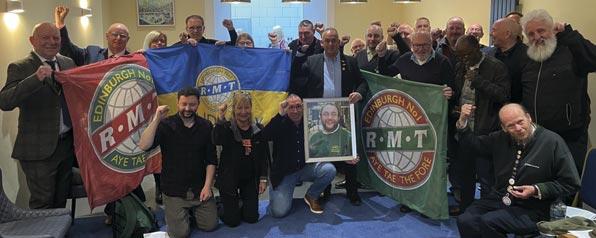
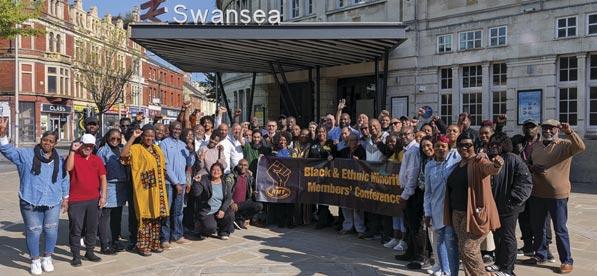
RMT’s campaign to bring outsourced workers inhouse is also part of the struggle for racial justice in the workplace senior assistant general secretary John Leach told delegates at the black and ethnic minorities members’ advisory conference in Swansea.
Thanking delegates at the well-attended conference for all the hard work that they put in as activists he urged them to put their full weight behind the new initiative.
“Some 15 per cent of Network Rail workers are from black and ethnic minorities and the figure is 25 per cent for those directly employed by the train operating companies. Yet when it comes to outsourced workers that jumps
to 58 per cent, highlighting shameful institutional racism,” he said, using figures compiled by RMT.
“Cleaners, caterers and security guards are on low wages, often on minimum wage.
“It is the right thing that the railway is being taken into public ownership, but the union won’t rest until all these people are brought in-house rather than left in the hands of private companies,” he added.
RMT regional organiser Steve Skelly welcomed delegates to Swansea and talked about the industrial and trade union heritage of the area.
Conference chair Walé Agunbiade gave the report on
the work of the committee over the past year including participation in the Notting Hill Carnival, Black Pride and hosting an event for South Asian History Month, with particular thanks to Nathan Wallace, Central Line East, for his work.
An event was organised for Black History month and the union’s annual reparations conference for which he thanked Mel Mullings, Bakerloo. She presented her work on the TUC Race Relations Committee and the research project Black women’s experience of sexual harassment, which was followed by a lively discussion.
Local anti-racist campaigner Andy Marshall, Justice for the Cardiff 5 Campaign, told
conference of the notorious case of injustice where local black men were fitted up by police for the murder of a woman in 1988.
Mr Marshall explained that they still campaign today as there are a further 16 cases of injustice since then showing that the judicial system that facilitated the injustice remains fundamentally unchanged.
Delegates backed a call for the union to support the campaign nationally.
Shoab Malik, Liverpool No. 5, moved an unanimously backed motion condemning the resumption of fighting in Gaza. He also lambasted Donald Trump’s plan to displace Palestinians from Gaza and called on the UK government and opposition
parties to support an immediate and permanent ceasefire in the region.
Chevvy Jacobs, East London Rail called for justice for the victims of hate crimes. She said that the government needs to “create meaningful punishments and sentencing for this, not the two-tier system that is currently in place. Parity across hate crime legislation will affirm that the government takes all hate crime seriously and will send a clear message to perpetrators that these offences will be met with an appropriate sentence”.
Conference’s longstanding commitment to the fight for reparations for slavery was reaffirmed with a call for the union to seek wider labour movement support for the annual RMT Reparations Conference that is taking place on 23 August, 2025.
Amarjite Singh of Wales TUC gave a talk on how reps can put anti-racism into practice in their workplace. Showcasing the pioneering anti-racism toolkit for union reps that his organisation has
produced he then led a workshop which turned out to be a highlight of the conference.
Ajayi Oluwarotimi, Paddington No 1 called on the union and other TUC affiliates to develop comprehensive anti-racist and anti-fascist education programmes in the face of the advance of the far right.
“We believe that these reactionary forces exploit poverty, alienation and despair in our communities. To defeat them we must build solidarity in our workplaces and communities and demand government policies to rebuild communities devastated by 15 years of austerity.
“We congratulate all those community activists and trade unionists who stood up to racist and fascist rioters in some English towns and cities in July and August 2024 who mobilised to intimidate black people, Muslims and migrants.
“The trade union and labour movement have a responsibility to fight against racism and fascists,” he said.
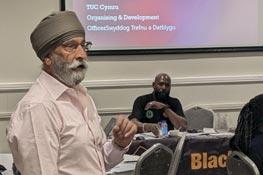
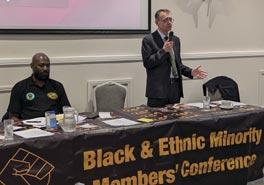
A new full-illustrated joint publication by RMT and the International Brigade Memorial Trust (IBMT) tells the untold story of the union’s historical fight against the rise of fascism in the 20th Century.
Using archive material held by RMT and the IBMT this latest union pamphlet reveals the full extent of the involvement of transport workers in the fight against Oswald Mosley’s Blackshirts in Britain and the struggle against fascism in Spain.
Many more workers also fought the fascists on the streets of Britain and NUR general secretary John Marchbank even took on Mosley in the courts and humiliated him.
Over 100 seafarers and rail workers volunteered to fight in the legendary International Brigades that fought Nazi-backed forces in Spain while European governments looked the other way in the hope of a fascist victory.


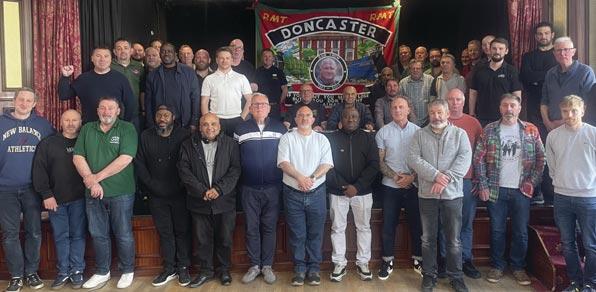
RMT activists set out a proactive strategy to boost membership and manage new technology at the engineering grades organising conference in meeting Doncaster, with delegates backing measures to strengthen union density and protect jobs in Network Rail.
Delegates agreed that building a stronger and more vibrant union is key to supporting Network Rail maintenance staff, ensuring that RMT is recruiting and retaining members more effectively.
The conference agreed to launch a mapping exercise to better understand why people join and why some leave.
Branches will roll out live, adaptable recruitment plans and report progress regularly to both branches and regional councils, with twice-yearly reviews at the National Maintenance Council to share
successful approaches.
Moving the hotly debated motion, Aidan Gibson, Wakefield and Healy Mills said: “The recent dispute has underscored the need for a comprehensive and coordinated approach to maintain membership density and fill representation gaps across the company.
“Recruitment and retention are essential to maintaining the strength and solidarity of our trade union. By implementing these measures, we can build a stronger, more united membership base within Network Rail and continue to effectively advocate for the rights and interests of our members,” he said.
Charles Fisher, South East London Operations & Engineering acknowledged that the union had faced some difficult challenges but that
recruitment retention and density were top priorities.
“The strength of our union comes in numbers. And I think this matter should go to the AGM, as it is the basis and foundation of how we function,” he said.
Jimmy Brown, Liverpool No.5 rose to support, saying that it was one of the most important resolutions.
“Without density and membership, the rest of it is all pointless. Without that strong collective bargaining power, what is the point of putting any resolutions through? Strong collective bargaining gives us better pay rises and better everything else,” he said.
Delegates also took a forward-looking approach to the rise of drone technology for inspections. While acknowledging the efficiency benefits, delegates insisted
that new technology must not come at the expense of jobs or safety standards. The resolution passed called for strong protections—requiring job security guarantees, upholding inspection quality, and ensuring transparent oversight as drones are introduced.
A public campaign will also be launched to raise awareness of the importance of safety and skills as the industry evolves.
Mark Hall, Wakefield and Healy Mills said: “In 2019, we were consulted on the introduction of drones, but it was very vague.
“Recently, we were consulted again about plans to use drones for track inspections, for p-way work and overhead line inspections.
“I don’t believe we can stop technology or prevent the use of drones altogether. But if we
are bringing a tool in that replaces our job, then our members should be the ones flying them—not someone else.
“If we’re not careful, these drone pilot roles could be outsourced, into grades organised by other unions.
“At the same time, we can’t allow a situation where drone pilots will be flown by operatives on the lowest wages.
“The recent pay offer stated there would be no highergrade duty linked to drone operation; people would just get their standard wage. So, you know full well it’ll be the lowest-paid workers flying drones and taking all the risk,” he said.
Mr Hall went on to point out that, while drone pilots in the construction industry can earn up to £60,000, operatives on Network Rail could be doing the same work for just £28,000.
“Network Rail are cutting corners to save money, and there are serious consequences if you get it wrong,” he said.
As an example, he noted that exceeding the legal
altitude with a drone can result in a £2,500 fine, underscoring that this work requires proper recognition, training, and pay, rather than being treated as a low-paid, casual role.
“We’ve got to protect them and make sure that these are well paid jobs,” he added.
Supporting the motion, John D’rozario, Birmingham engineering said that the issue needs to be challenged not only from an industrial perspective but also from a health and safety standpoint.
“There are real concerns here—for example, even the smaller drones, which use 2.3 kg frames, can fly up to 120 metres above the track.
“If you calculate the impact force of one of those hitting a train, it comes out to about 1.5 tonnes, that risk shouldn’t be ignored,” he added.
Other motions included calls to address unsafe working practices, with a strong push to end the controversial individual working alone (IWA) policy within Network Rail, which puts workers at significant risk.
Mr Gibson said that the company’s assertion that risks associated with working alone
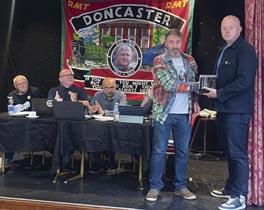
can be mitigated by the use of an app were wholly unacceptable.
“Such technology does nothing to protect a worker who suddenly becomes incapacitated due to an accident, injury, or illness.
“This approach demonstrates a lack of commitment to the safety and wellbeing of employees and disregards the real dangers faced by those working in isolation,” he said.
He added that worker safety must be non-negotiable and always take precedence
over operational priorities of the company bosses or costsaving measures.
“The practice of sending workers out alone is unacceptable and must be challenged at every level to protect the lives and wellbeing of our members,” he said.
Delegates also raised concerns about the detrimental effects of current rostering practices, which lead to increased fatigue and inefficiency, urging for changes to protect workers’ health and safety going forward.
If you are experiencing difficulties in the workplace and need advice regarding a potential employment tribunal claim contact the union.
In the first instance, ensure that you contact your local RMT Representatives or Regional Organiser. Then complete an L2 – Request for Legal Assistance (available on-line) and send it to your Regional Office with all supporting documentation.
RMT’s legal department deals with virtually all cases from assessment to the case’s conclusion at a tribunal for members across England and Wales. The legal department has also submitted claims to Employment Appeal Tribunals. The in-house legal department is now firmly established and employs four solicitors and continues to advise and support
•
•
•
•
•
members in their work-related criminal cases in the Magistrates Court.
This often involves defending members against false allegations made by the public of assault, false allegations of theft and alleged driving offences. Furthermore, it continues to offer tailored advice and support for bus and taxi drivers, in respect of their licensing issues, licensing appeals before the Magistrates Court, driving offences, and in respect of appearances before Traffic Commissioners.
The In-house legal department continues to strive to deliver a first-class service to all of members. They are committed to provide a strong service to assist the union through the ever-changing legal landscape and their successes have grown yearly.
Thompsons Solicitors has successfully secured compensation for two track workers who developed Hand Arm Vibration Syndrome (HAVS).
One member was awarded £12,000 in compensation after more than three decades of using high-vibration tools without adequate safety measures in place.
The worker, 65, was employed as a Track Worker and later a Team Leader for Network Rail and its predecessors at various locations between 1989 and his retirement in 2024.
Throughout his career, he used rail drills, hand drills, angle grinders, and disc cutters to perform tasks such as drilling sleepers, hammering bonds to rails, grinding rust, and cutting concrete and various types of rail materials.
Despite spending 32 years using vibrating tools, he was not provided with proper health surveillance or exposure monitoring in the early years of his employment.
The worker first experienced intermittent blanching and pain in 2019, prompting assessments by occupational health. However, despite reporting symptoms,
he was repeatedly deemed fit to work with vibrating tools, with no diagnosable condition identified in 2019 and again in 2021.
It was only after presenting photographic evidence of finger blanching in 2023 that he was finally diagnosed with HAVS and Dupuytren’s contracture in May and July 2023, respectively.
Although he transitioned to an office role in November 2021 due to a separate back condition, the damage from decades of excessive vibration exposure had already been done. He believes that the lack of adherence to health and safety regulations, inadequate risk assessments, and poor tool time management contributed to his condition.
While wrist-worn monitoring devices and guidance on tool usage were introduced in later years, they came too late to prevent long-term injury.
The worker pursued a claim through his RMT membership, arguing that Network Rail failed in its duty to assess and control vibration risks, monitor tool use, and implement preventative measures. The claim was successfully settled out of court, with the worker securing compensation.

Network Rail admitted liability. Thompsons Solicitors also successfully secured compensation for another rail maintenance worker who developed HAVS after years of using high-vibration tools without proper safety measures in place.
The worker, aged 57, was employed as a Process Leader for twenty years for Wabtec in Doncaster, where he carried out tasks such as grinding, welding, and using rivet guns, impact drivers, and needle guns—with the needle guns causing the most intense vibration exposure.
Despite working long shifts with frequent overtime, he was not trained on the risks of vibration exposure, and in the earlier years, there was no monitoring of his exposure or proper health surveillance in place.
While the symptoms of HAVS first appeared in 2012, he was not assessed for the condition until 2021 —nearly a decade after symptoms
began. By this time, his condition had worsened, leading to finger blanching in both hands.
A personal risk assessment in 2022 confirmed his exposure, and a further occupational health assessment in 2023 reaffirmed his diagnosis, following which he was removed from using vibratory tools.
His condition has made it difficult to secure alternative employment.
Following his diagnosis the
President’s Column
worker pursued a claim, arguing that his employer failed in its legal duty to assess and reduce the risks of vibration exposure, monitor tool use, and provide adequate training.
The worker secured £6,495 in compensation, with the case settling without an admission of liability shortly after the issue of court proceedings.
Mark Allen, a workplace injury and illness lawyer at Thompsons Solicitors who represented the members,
said that these cases highlighted the serious and preventable risks of HAVS in industries reliant on vibrating tools.
“Our clients both spent years exposed to excessive vibration without adequate health surveillance or monitoring, resulting in a lifechanging condition that has affected his ability to work.
“Through their RMT membership, we were able to secure a fair compensation package that reflects the
By the time this article is published, elections will have taken place across many local authorities in England. For unions like ours and the members in them to thrive we must take stock of the political landscape—and more importantly, challenge the dangerous and dishonest narrative that Reform UK is somehow a party for working people and families.
Let’s be clear: Reform UK is not a grassroots movement. It is a registered business, led by a privately educated former commodities trader, backed by the super-rich and committed to policies that would harm—not help— ordinary people.
Nigel Farage, the figurehead of Reform UK, is no friend of the working class. Educated at Dulwich College and a veteran of the City, Farage has never worked in a factory, on a railway, or in a care home.
He hasn’t relied on public services or worried about the next wage packet. While there’s nothing inherently wrong with a private education or a career in
finance, let’s not pretend that this man understands—or even cares about—the struggles of working people.
Farage offers dangerously simplistic answers to the complex problems we face.
His stock-in-trade is scapegoating pointing the finger at migrants, at benefit claimants, at anyone who isn’t responsible for the deeprooted inequality in this country.
This is no accident—it’s a deliberate strategy to divide us and deflect attention from the real causes of hardship: a broken economy rigged in favour of the wealthy, underpinned by years of austerity and attacks on workers’ rights.
Reform UK has consistently opposed policies that would strengthen the position of working people. They have stood against proposals for stronger employment protections, including the Workers’ Rights Bill. Reform would destroy the hard fought workers rights we have already secured and impose further draconian measures that would have damaging
impact on their livelihoods and ensure that they receive the support they deserve.
“We hope this serves as a reminder to employers of the importance of protecting their workforce from preventable occupational illnesses.
Employers must take proactive steps to protect workers from HAVS, ensuring proper risk assessments, monitoring, and early intervention before permanent damage occurs,” he said.
consequences for all workers.
But challenging the Farage narrative is not enough on its own. To win people away from these dangerous distractions, we must offer a real alternative—an alternative rooted in justice, solidarity, and economic fairness. We in the trade union movement must step forward and use our collective strength to push for real change.
Our general secretary has rightly called for the proper return of sectoral collective bargaining. This would be a transformative step: enabling workers to bargain across whole sectors would mean better pay, more job security, and dignity in the workplace. It would also mean more tax revenue to invest in public services that benefit all of society.
We must also challenge the scapegoating of migrants and the poor. Immigration is not the cause of hardship— inequality is. The truth is that this country is still wealthy, but that wealth is hoarded at the top. Labour must find the courage to tax the richest in

society and invest in people and communities. Doing so is not just a moral imperative—it makes economic sense.
Thriving communities, with strong public services and decent jobs, drive growth and stability.
Labour, the party born of the trade union movement, must remember what it was created to do, it will not win back the hearts minds and votes of communities if it continues to repeat the strategies of austerity. The trade union movement have our part to play. We must make the case for collective organisation.
Farage and his ilk offer anger and division. We can offer practical solutions by organising together in unity. Millions of workers should speak louder than the millions of pounds that prop up parties like Reform.
George Welch

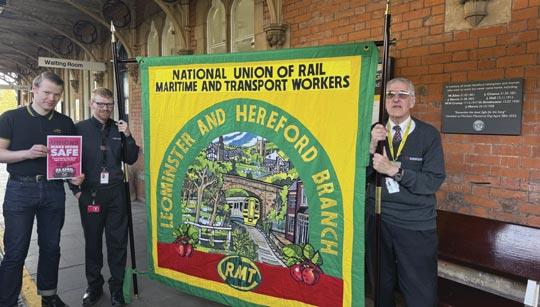
A plaque was unveiled in Hereford railway station on Workers’ Memorial Day, April 28, in memory of railway workers who were killed while on duty in Hereford.
The plaque lists the names of seven railway workers who died between 1851 and 1928, each having been killed in various accidents at or near the station.
April 28 is a day to remember workers who were killed, disabled, or injured at work and to draw attention to the ongoing struggle for better conditions and safety measures for workers.
The plaque has been installed by Transport for Wales working with the local branch.
Leominster & Hereford RMT branch secretary and union rep, James McLelland, said that the branch was very pleased that TfW agreed to install this plaque following our approaches to management.
“The railway can be a very dangerous place to work.
“Even as late as 1980, 36 workers were killed on duty every year, a rate of one fatality every ten days.
“Thanks to the hard work of our unions in introducing and enforcing safety regulations for the benefit of staff and passengers, not a single worker has died in a railway accident since 2021.
“Plenty of people moan about health and safety nowadays but it’s important to remember that every health and safety regulation that exists was written in blood, and that people died for those regulations to be in place.
“Unfortunately, accidents do still take place in the
workplace, including right here in Hereford, and today is a day not just to remember the people who’ve died in previous accidents, but to redouble our efforts to ensure that everyone who goes to work comes home again to their families.”
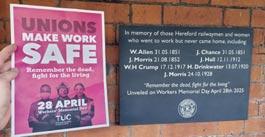
Colin Stewart is an OCS cleaner based at Plymouth station. He is a stalwart of the union, very rarely misses a branch meeting and enjoys a good picket line! He is a huge advocate for cleaners and disability rights. Colin has achieved his 10-year service and the branch applaud him for his dedication.
Terry Parmenter is a Train Manager based in Plymouth. He has supported the branch loyally throughout his time and is loved and respected by all his peers.
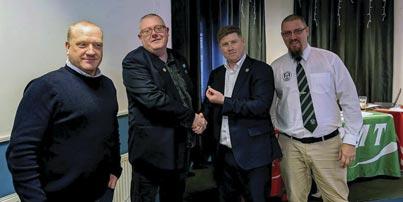
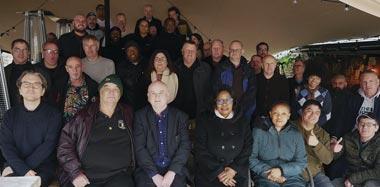
RMT’s South East Regional Council meeting was hosted by Chiltern Line branch in Aylesbury recently.
Outgoing general secretary Mick Lynch presented Ian Punter, with his 50-year badge and commemorative certificate. The regional council also presented Mick with a gift in recognition and gratitude for his service to the union, particularly his time as general secretary.
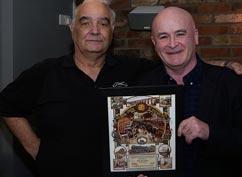

Coventry 1
Branch chairman
Shakeel Goulthorp has reported that Raj Joshi, an RMT member for 34 years, has passed away.
Raj served as a local rep, health and safety rep, union learning rep, branch activist and recruiter. He worked under British Rail, Virgin Trains and Avanti West Coast as a Team Leader at Coventry railway station who took great pride in his job and made sure the station ran efficiently.
“He will be sadly missed by his family and his railway colleagues,” said Shakeel.
You just save a minimum of £5 per month and then after a short time, you can borrow from us. As you pay down your loan amount each month, you only pay interest on the outstanding balance.
There are no hidden costs to saving and borrowing with the RMT Credit Union. If you pay up early you simply pay the balance and any interest due at the time. NO Handling or Administration charges and NO penalty charges. We have accounts to help you put money aside for your holidays, Christmas or even encourage your children to save. For more information, check the RMT Credit Union Website or fill out the application form on inside back page. Run by RMT members for RMT members and their families.



020 3535 5820 https://rmtcreditunion.co.uk/

Use the QR code to join to get help at work and save money

RMT has developed a number of benefits to save members money. This includes negotiating access to savings and special offers from our approved partners.
The union has a dedicated team of elected officers and local reps to serve your interests negotiating with employers on issues from pay, hours of work, pensions and working conditions. They are supported by a team of researchers to formulate pay claims to obtain the best negotiated terms for you.
The union has a political fund to run campaigns and provide a political voice to benefit members’ interests in the workplace. RMT has a very active parliamentary group which raises issues of concern for members at Westminster, the Scottish Parliament and Welsh Assembly.
Personal injury claims cover if you suffer an accident in work or outside work. RMT underwrites settlements that would not be provided by no-win, no-fee companies. Call 08457 125 495.
Members who have suffered an industrial disease will receive free legal support to make a claim. Such claims are underwritten by the union and members will not have any deduction from their settlement unlike claims run by no-win, no-fee companies. Call 08457 125 495
Should a member find themselves unfairly
dismissed, discriminated against or have any claim which has reasonable prospects of success at an Employment Tribunal, RMT will provide legal representation and pay the fee. Even if the union is advised that the claim is unlikely to succeed, members who make a claim are eligible to receive free legal advice.
Payable if you have an accident at work or on the way to or from work. Accident benefit is only payable if you have been off for three days or more. Accident must be reported to branch secretary within 26 weeks in order to qualify for accident benefit.
Payable to any member who retires over the age of 60 or aged 55 if retired through redundancy or resettlement. Ill health retirement is also payable; proof of this must be sent with application for retirement benefit.
The union can provide a personal taxation service and will preparation service.
Payable to any member who is experiencing loss of wages through being permanently demoted or downgraded as a result of illness or injury. Payment of £300 provided that member reports this to branch secretary within 12 weeks.
The beneficiaries of this fund would be any child of a member or spouse if the member dies in service or if a members’ spouse dies and the member has responsibility of the children. Benefit is paid while a child is in full-time education up until the age of 22. Payment is made quarterly and the rate is £12.00 per week for children up to the age of 16, then £12.75 per week from 16 to 22.
Accessible savings and affordable loans from RMT’s Credit union. www.rmt.org.uk/about/credit -union
Shop online with RMTrewards.com and earn cashback savings from hundreds of retailers, like B&Q, Argos and Tesco. It’s free to join, plus you’ll get a FREE £10 Welcome Bonus in your online account! (Terms and conditions apply) www.rmtrewards.com
if you drive a company vehicle as part of your job you can join the RMT fines pool for £7 per year. The Fines Pool will reimburse members for any speeding fines, related court costs and lost time to attend a court hearing. www.rmt.org.uk/memberbenefits/fines-pool
A Death Grant of £600 is payable to the nearest relative or legal representative if a member dies through any cause prior to retirement.
Fancy cashback on your everyday shopping? Use your RMT Prepaid Plus Cashback card at over 50 partner retailers, including Sainsbury’s, ASDA and Boots, and earn unlimited cashback! It’s different to a credit or debit card - you can only spend what you load so there’s less chance of getting carried away. www.rmtprepaid.com
As a benefit of your RMT membership you can register for £5,000 Free Accidental Death Cover. Cover is for UK residents aged 18-69.12 months free cover.
Annually renewable and always FREE. This policy is underwritten by Stonebridge International Insurance Ltd. www.rmtprotect.com
For a small monthly premium you can claim cash-back on dental, optical and therapy treatments. Visit www.bhsf.co.uk
Assistance for members with their potential employment tribunal claim offered through the RMT’s In-house Legal Department.



Keep your RMT membership details up-to-date
In the light of draconian anti-trade union laws that have been used against the union, members should keep their personal data up to date. It also important to note that in order to keep members informed your union requires your mobile telephone number and email address.
Members can do this via the RMT website, telephone the RMT helpline above, or writing to the membership department at RMT head office, Chalton Street, London NW1 1JD.